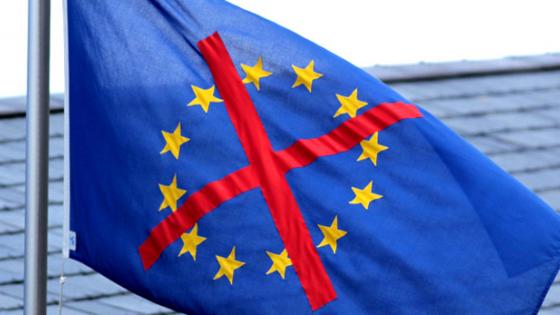There has been growing interest in the economic causes and implications of the success of ‘populism’ and identity politics1 around the world in recent years (e.g. Rodrik 2018). The multilateral global order that had been underpinning the progress of globalisation after WWII has faced a backlash in the form of a desire to bring control over policies and their outcomes back to the national level. And in the recent period, the most-often cited risks to the economic outlook in advanced economies have been political uncertainties related to trade protectionism, Brexit, and geopolitical risks.
The interest in Euroscepticism was in many respects a predecessor to this literature and it might bear some interesting lessons for beyond Europe. Unsurprisingly, many of those advocating keeping sovereignty at the national level, or repatriating it, saw the single currency as a symbol of what they were fighting against. The European sovereign debt crisis seemed to give them a simple narrative – “we told you so”. But herein lies a paradox. With the crisis, trust in politics and institutions (national and European) has suffered a blow and parties traditionally identified as Eurosceptic have prospered,2 but support for the euro stands at a record high and support for EU membership has recovered to pre-crisis levels.3 What can explain this paradox? And can we infer some lessons of relevance to the global debate?
Take citizens’ concerns seriously and address salient issues
Euroscepticism can broadly be defined as sceptical or negative attitudes towards the EU and the process of European integration (Taggart 1998). The literature tends to distinguish between ‘soft’ and ‘hard’ forms of Euroscepticism, i.e. opposition to EU policies and opposition to the process of European integration itself, respectively (Taggart and Szczerbiak 2002). As generalised support for the EU has recovered in recent years, especially after the UK’s EU referendum, Eurosceptic parties have strategically moved away from hard forms of anti-EU and anti-euro sentiments (Chopin et al. 2019). Indeed, they see more potential in criticising the EU institutions’ current policies, and advocating replacing them with policies reflecting their own ideologies (Dennison and Geddes 2018). In other words, there has been a weakening of hard Euroscepticism and a strengthening of soft Euroscepticism.
In explaining the electoral successes of these parties, the key factor was the ability to leverage salient issues. For instance, during the European sovereign debt crisis the economic situation and unemployment were deemed to be the most important challenges facing European citizens. From 2015, the focus shifted toward immigration. Traditionally, Eurosceptic parties have attracted voters by offering radical alternatives on these issues that resonated with citizens’ concerns. They were in a good position to do so as the salient issues related to economic and cultural fears were also those that had previously underpinned harder forms of Euroscepticism, including the Leave campaign in the UK. The same might not apply to environmental issues, which are increasingly at the core of Europeans’ concerns and benefit environmentalist rather than Eurosceptic parties, as shown in the recent European Parliament elections.
The starting point to reengaging citizens should thus be to listen more attentively to them. Survey-based research can help in identifying salient issues and appropriate policy responses (Stantcheva 2019, Stantcheva forthcoming).
Moreover, the answer to Euroscepticism is not as simple as “less Europe”. In fact, citizens’ trust in national institutions is even lower than their trust in EU institutions on aggregate. What really matters is to provide a timely answer to citizens’ concerns, be it through national or supranational policies. It is the failure to do so – or doing too little too late – that might lead to a popular backlash at both levels. There is a trade-off in that regard. While supranational measures or delegation of competence may require difficult negotiations due to differences in national situations and preferences, they are often needed to provide effective solutions to cross-border problems. Identifying ways to deal with the heterogeneity of situations and preferences is thus essential (Jamet 2011).
Build on a sense of togetherness
Popular support depends, however, on more than just addressing citizens’ concerns. A sense of community – and the economic, political, and historical narratives on which it is based (Eichengreen 2018) – also matters. In the UK, the perception that the EU threatened the national cultural identity provided fertile ground for the vote to leave the EU.4 Symmetrically, the single currency provides an example of the positive impact of European identification. This is illustrated by the divergence between support for the euro and trust in the ECB (Figure 1). While the former remained stable at high levels, the latter declined steeply in the crisis and only slowly recovered in recent years. The literature has sought explanations for this divergence by looking at individual-level data (Bergbauer et al. 2019). Support for the euro appears to have a strong value-based component. It correlates positively with feelings of European identity and with support for the idea of European integration (Hobolt 2014, Hobolt and Wratil 2015). In contrast, trust in the ECB appears to depend more on the EU’s perceived performance. Favourable views of the European economy,5 expectations of a future economic upswing (Farvaque et al. 2012, Kaltenthaler et al. 2010) as well as satisfaction with the EU’s democratic and performance (Kaltenthaler et al. 2010), trust in other EU institutions6 (Ehrmann et al. 2013, Hayo and Neuenkirch 2014) and satisfaction with EU crisis measures (Bergbauer et al. 2019) are all positively correlated with trust in the ECB.
Figure 1 Net support for the euro and trust in the ECB, 1999-2018
The resilience of support for EU membership and the euro is thus underpinned by a strong sense of common identity, which should be unsurprising but is often underestimated. In fact, more than seven out of ten euro area and EU citizens feel that they are citizens of the EU, a record high since the beginning of the series in 2010.7 This suggests that the stability of an open economic and political system depends not primarily on its performance and trust in its institutions, but on the sense of togetherness underpinning that system. The stronger this sense of togetherness, the more a political entity can survive temporary underperformance and distrust in institutions. At the same time, it increases the likelihood of a political competition for the definition of the values of the polity – cleavages along societal values are indeed playing an increasing role in European politics (Chopin et al. 2019).
Foster public trust through accountability and engagement
It could be tempting to argue that, especially for independent institutions, low trust is unwelcome but eventually of little relevance for the execution of their mandates. Taking central banks as an example, we are not aware of any evidence that the transmission channels of monetary policy are impaired or strengthened by the level of trust, nor that central bank decisions are directly influenced by it, although there is evidence that trust does influence inflation expectations (Melina and Schmidt 2018).
Nevertheless, lower trust and legitimacy may, over time, lead to questioning key principles, with the potential to impact on policy outcomes. ‘Populist’ movements around the world indeed question ‘elite rule’ (Rodrik 2018). As a case in point, independent central banks that take policy decisions on the basis of expert analysis, and thus represent a form of technocratic governance, have increasingly moved into the focus of governments, including in India, Turkey, and also the US (The Economist 2019). Binder (2018) finds that out of a sample of 118 central banks, 10% were subject to some form of political pressure in a given year over the period 2010-2018.
In several of these instances, attempts at political influence over central banks came at a time when public trust in institutions was low. In fact, low trust in institutions appears to favour anti-establishment parties (Algan et al. 2017, Dustmann et al. 2017). Once in office, it can thus be seen as a rational choice for a ‘populist’ government to influence its central bank’s decision making, the more the population is distrustful of technocratic institutions and disgruntled with economic policy outcomes.
The answer is not to simply dismiss populism out of hand. It should first be to invest in reinforcing trust in institutions and the perception that they act in the public interest. In the case of central banks, this is unlikely to be achieved by subjecting them to political influence, which would only increase the perception that central banks are not impartial. It is more likely to be achieved by ensuring that there are effective checks and balances to their power, for instance through active parliamentary scrutiny (Fraccaroli et al. 2018)8 and the effective judicial review of central banks, while respecting their independence. This can contribute to avoiding the perception that central banks have unchecked power, which is associated with lower trust. Moreover, credibility and ethics have been shown to be key determinants of trust in the ECB (Angino and Secola 2019). Finally, central banks should ensure that they engage with the general public (Graeff 2019) – to be successful, they need to speak a language that people can understand and that connects emotionally with them, engage with critics, and make the case for an own, authentic, fact-based discourse against ‘post-truth politics’ (Graeff 2017).
Conclusions
From the Euroscepticism literature, it is possible to draw a number of key lessons that are relevant for the sustainability of economic integration: take citizens’ concerns seriously and address salient issues, build on a sense of togetherness, and care about public trust. Arguably, insufficient achievements on these fronts played a role not only in Brexit, but also in the backlash against the multilateral world order underpinning globalisation. Euroscepticism may therefore hold lessons that are useful in navigating the current political uncertainties and inspiring a course of action at global level.
Authors’ note: The views expressed in this column belong to the authors only and are not necessarily shared by the institutions to which they are affiliated. We thank M Ehrmann, G Glöckler, H-J Klöckers and J Lindner for useful comments and suggestions.
References
Algan, Y, S Guriev, E Papaioannou, and E Passari (2017), “The European Trust Crisis and the Rise of Populism”, Brookings Papers on Economic Activity, Fall, 309-400.
Angino, S, and S Secola (2019), “Pillars of trust: What determines public trust in the ECB?”, mimeo.
Bergbauer, S, J-F Jamet, E Persson, and N Hernborg (2019), “The Reputation of the Euro and the ECB: Interlinked or Disconnected?“, Paper presented to the EUSA conference.
Binder, C (2018) “Political Pressure on Central Banks”, working paper, available at SSRN.
Chopin T, and J-F Jamet (2016), “Le Brexit : la tension entre les deux Europe”, La Vie des idées, 23 June.
Chopin, T, N Fraccaroli, N Hernborg, and J-F Jamet (2019), “The Battle for Europe's Future: Political Cleavages and the Balance of Power Ahead of the European Parliament Elections”, Jacques Delors Institute Policy Paper, 237, April.
Dennison, J, and A Geddes (2018), “A Rising Tide? The Salience of Immigration and the Rise of Anti-Immigration Political Parties in Western Europe”, The Political Quarterly, 90 (1), 107-116.
Dustmann, C, B Eichengreen, S Otten, A Sapir, G Tabellini, and G Zoega (2017), “Populism and trust in Europe”, VoxEU, 23 August.
Eichengreen, B (2018), The Populist Temptation: Economic Grievance and Political Reaction in the Modern Era, Oxford University Press.
Ehrmann, M, M Soudan, and L Stracca (2013), “Explaining European Union Citizens’ Trust in the European Central Bank in Normal and Crisis Times”, The Scandinavian Journal of Economics, 115, 781-807.
Farvaque, E, M A Hayat, and A Mihailov (2012), “Who Supports the ECB? Evidence from Eurobarometer Survey Data”, Department of Economics, University of Reading, UK.
Fraccaroli, N, A Giovannini, and J-F Jamet (2018), “Accounting for accountability: The evolution of the ECB's accountability practices during the crisis”, VoxEU.org, 3 October.
Graeff, C (2017), “Mind Your Language - Populist Discourse and the Future of Europe”, Horizons, Autumn, Issue no. 9.
Graeff, C (2019), “‘Effective transparency’- how to be beacon of orientation in a complicated world”, remarks at the “Central banks’ policy signals in informational noise” policy panel at the “From Mystery to Transparency” conference organised by the Central Banks of Ukraine and Poland, Kiev, 24 May.
Hayo, B, and E Neuenkirch (2014), “The German public and its trust in the ECB: The role of knowledge and information search”, Journal of International Money and Finance, 47, 286-303.
Hobolt, S B, and C Wratil (2015), “Public opinion and the crisis: the dynamics of support for the euro”, Journal of European Public Policy, 22 (2), 238-256,
Hobolt, S B (2014), “Public attitudes towards the Euro crisis”, In O Cramme and S B Hobolt (eds.), Democratic politics in a European Union under stress, Oxford, Oxford University Press, 48-66.
Ioannou, D, J-F Jamet, and J Kleibl (2015), “Spillovers and Euroscepticism”, ECB Working Paper no. 1815.
Jamet, J-F (2011), “The Optimal Assignment of Prerogatives to Different Levels of Government in the EU”, Journal of Common Market Studies, 49 (3), 563-584.
Kaltenthaler, K, C J Anderson, and W J Miller (2010), “Accountability and Independent Central Banks: Europeans and Distrust of the European Central Bank”, Journal of Common Market Studies, 48, 1261-1281.
Kuhn, T (2019), “Grand theories of European integration revisited: does identity politics shape the course of European integration?”, Journal of European Public Policy, 2019/05.
Melina, S, and T Schmidt (2018), “The role of central bank knowledge and trust for the public’s inflation expectations”, Deutsche Bundesbank Discussion Paper, no. 32/2018.
Rodrik, D (2018), “Populism and the economics of globalization”, Journal of International Business Policy, 1(1–2), 12–33.
Stantcheva, S (2019), “Broader Horizons – A Ted-style Talk”, Brussels Economic Forum 2019.
Stantcheva, S (forthcoming), “Understanding Economic Policies: What do people know and learn?”.
Taggart, P (1998), “A Touchstone of Dissent: Euroscepticism in Contemporary Western European Party Systems”, European Journal of Political Research, 33, 363-388.
Taggart, P, and A Szczerbiak (2002), “The Party Politics of Euroscepticism in EU Member and Candidate States”, Opposing Europe Research Network Working Paper, 6, 1-45.
The Economist (2019) “The independence of central banks is under threat from politics“, 13 April.
Endnotes
[1] Identity politics describes the phenomenon whereby citizens’ collective identities influence political discourse, voting behaviour and ultimately policy making. For an analysis of the increasing role of identity politics and its disruptive potential in the European context, see Kuhn (2019).
[2] Following the recent European Parliament elections, Eurosceptic parties will hold roughly 25% of the seats in the new parliament. The vote share of Eurosceptic parties, already on the rise since the 2000s, has also been particularly pronounced in national elections in recent years.
[3] Standard Eurobarometer Survey (EB 90), November 2018, and Eurobarometer Survey 90, European Parliament, October 2018.
[4] The 2015 British Social Attitudes Survey showed that 47% of the British population considered the EU as a threat to the cultural identity of the UK (compared to 30% having the opposite opinion). See also Chopin and Jamet (2016).
[5] Respondents’ judgment the European economy is more important than their judgment of the national economy, which has no significant influence on trust in the ECB (Kaltenthaler et al. 2010). This is in line with the finding that economic developments in other Member States affect levels of Euroscepticism domestically (Ioannou et al. 2015).
[6] The strong correlations between trust in different EU institutions may at least partly result from the design of the Eurobarometer survey, which groups together questions on trust in European institutions, and on which the larger part of research on ECB trust is based.
[7] When asked what the EU means to them personally, euro area respondents first mention the freedom to travel, study and work anywhere in the EU, the single currency, and peace.
[8] Here again, supranational central banks and institutions face an additional challenge as they need to reach out to heterogeneous audiences in different languages. Moreover, the ability of supranational democratic institutions to effectively hold them to account compared to national democracies is often questioned compared to national set-ups, requiring efforts to strengthen supranational accountability (Fraccaroli et al. 2018).









